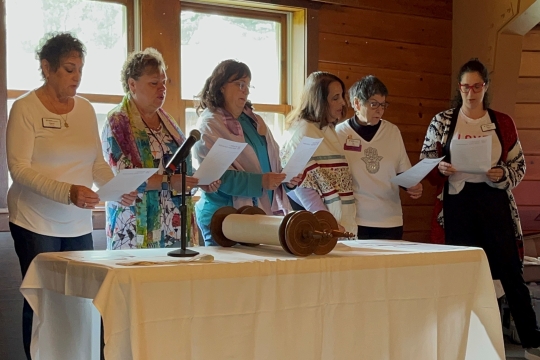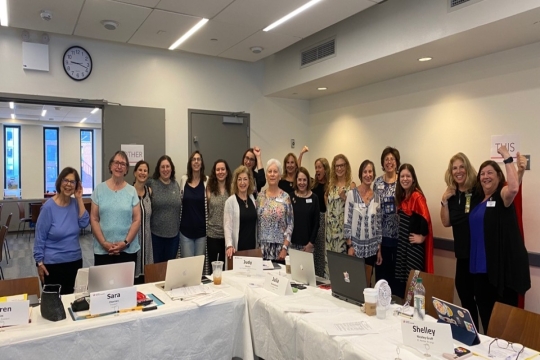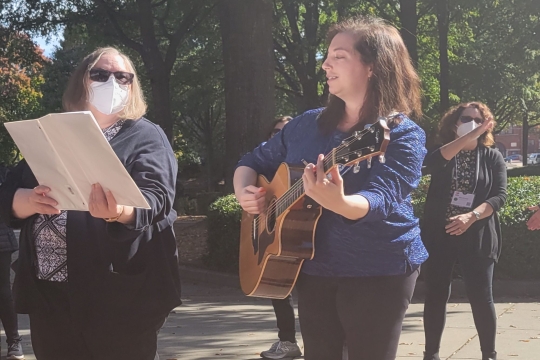
From the time I was a teenager, I have always thought of myself as a feminist. I firmly believe that women should be offered all the same opportunities as men. I earned a college degree planning to have a career. As a young wife and mother, I assumed that my husband and I would divide the household and childcare chores evenly. However, I did not encounter Jewish feminism until I was the young mother of two daughters. Having been raised in the Reform Movement, I was not really aware of the way women could be excluded in congregational life.
The so-called “second wave” of Jewish feminism began in the 1970’s along with other women’s movements. Some of the innovations that came from the movement include Baby-naming ceremonies, Women’s Seders, Rosh Chodesh groups, and the use of gender-neutral language in liturgy. The twentieth-century women that were advocating for these changes can look to this week’s Torah portion for the earliest inspiration for women’s advocacy.
In Parashah Pinchas, the Israelites’ forty-year journey through the desert was coming to an end. As is often the case in the Book of Numbers, a census was taken. The purpose of this accounting was to divide the land among the new generation of Israelites who were to enter the Promised Land. Zelophehad, a descendent of Manasseh, died in the wilderness and left no sons. His five daughters, Mahlah, Noah, Hoglah, Milcah, and Tirzah, approached the tent of meeting with a proposal. The sisters wanted to preserve their father’s legacy, so they demanded that they be given his portion of land. Moses brought their case to Adonai, and God agreed that they have this right. Going even further, God decreed that they be given a hereditary holding that they could bestow on their descendants as well. The resulting new law preserved the integrity of family property for all generations and gave economic security to women who have no brothers.
These remarkable sisters challenged the inheritance system and initiated Torah law, leaving their own legacy for future generations. The Women of Reform Judaism (WRJ) has continued this legacy of social action and change, advancing the role of women in secular and Jewish life. I’m proud to be a part of this organization that strives to strengthen the voice of women and advocate for women’s rights.
WRJ has been advocating for women since it began over 100 years ago. In the secular world, our founders were suffragists who marched for the right to vote. Later, others supported the Equal Rights Amendment, equal pay for equal work, reproductive rights, and many other causes important to all women in North America. The resolutions that WRJ passes each time we convene cover an amazing array of issues. After passage, WRJ puts together wonderful resources for women’s groups to study and implement programs to take action on these initiatives.
WRJ has also pushed forward great transformations within the Jewish world. Our organization has called for the inclusion of women in all aspects of Jewish life: on governing bodies of congregations, as B’not Mitzvah, and as rabbis and cantors. In Israel, we have advocated for women to be allowed to pray at the Kotel, as well as standing against other rights violations such as “modesty” legislation and separation of genders on buses and airplanes.
One of the most significant contributions WRJ has made to amplify the voices of Jewish women is the publication of The Torah: A Women’s Commentary. This groundbreaking volume is the first Torah commentary to be authored only by women. It brings a woman’s perspective to the study of the Torah, adding depth to the meaning of the stories. For example, one of the authors of the Pinchas chapter stressed how Zelophehad’s daughters are all named each time they are mentioned in the Torah. Her view is that this emphasizes their importance in the larger context of the Torah. In my mind, I was able to contrast this with Noah’s wife who is not named at all. I find that this book is an invaluable resource when writing a D’Var for a meeting, Sisterhood Shabbat, or an article like this for a newsletter.
The parashah ends with a list of occasions throughout the year when the Israelite community is required to make sacrifices. It seems fitting that one of these occasions is Rosh Chodesh, the celebration of a new moon. This is one of the celebrations that have been revived by the Jewish feminist movement as a way to reclaim Judaism for modern women. May we as women go from strength to strength as we continue to ensure that our voices will be heard.
Lori Motis is the Atlantic District President and a member of Congregation Beth Or in Maple Glen, PA
Related Posts

Parashat Yom Rishon shel Rosh HaShanah

Cultivating a Culture of Accountability and Belonging


